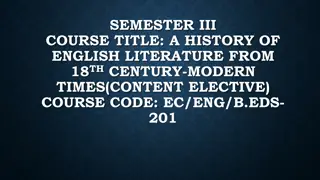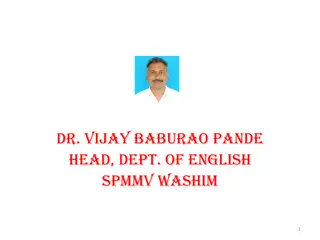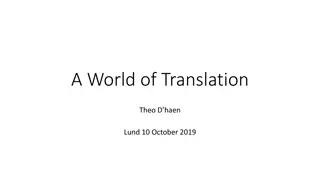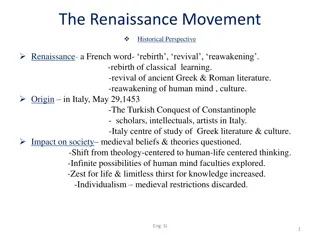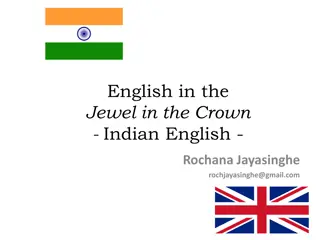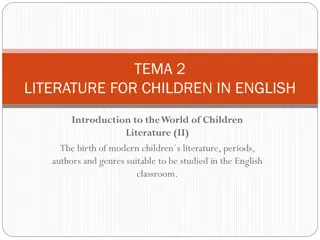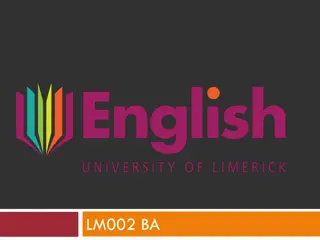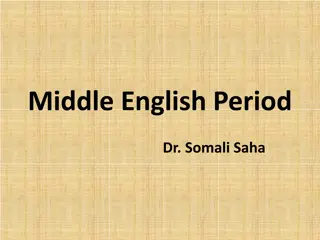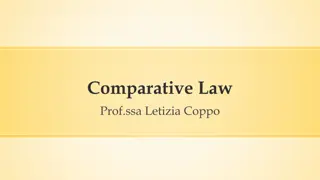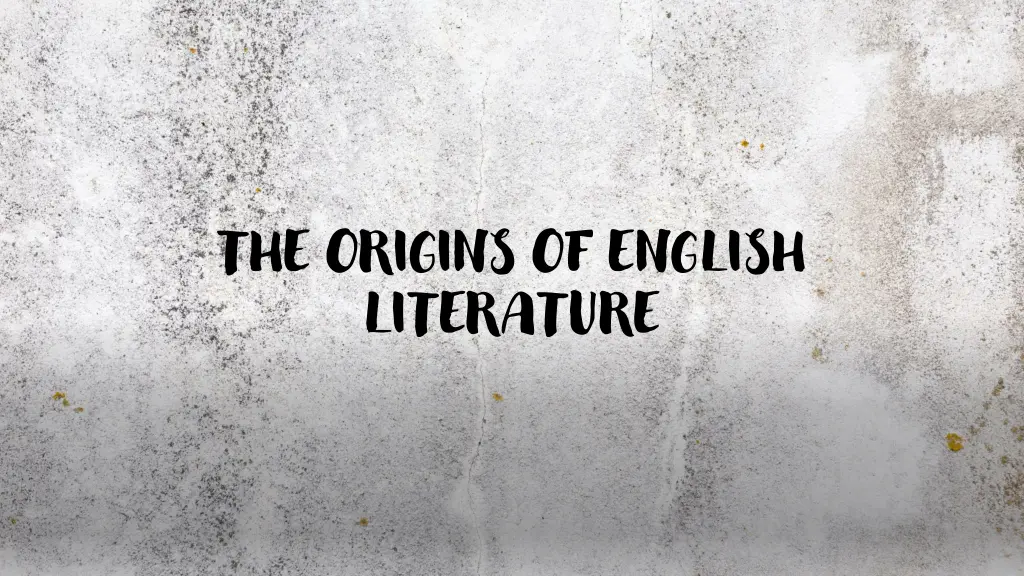
Exploring the Origins and Characteristics of Old English Literature
Discover the origins of English literature during the Anglo-Saxon era leading up to the Norman Conquest. Explore the significance of Christian monks in preserving Old English works, the blend of Germanic and Christian elements in literature, the role of the scop in storytelling, and the various forms of Old English poetry. Uncover the rich history and cultural influences that shaped Old English literature.
Download Presentation

Please find below an Image/Link to download the presentation.
The content on the website is provided AS IS for your information and personal use only. It may not be sold, licensed, or shared on other websites without obtaining consent from the author. If you encounter any issues during the download, it is possible that the publisher has removed the file from their server.
You are allowed to download the files provided on this website for personal or commercial use, subject to the condition that they are used lawfully. All files are the property of their respective owners.
The content on the website is provided AS IS for your information and personal use only. It may not be sold, licensed, or shared on other websites without obtaining consent from the author.
E N D
Presentation Transcript
THE ORIGINS OF ENGLISH LITERATURE
INTRODUCTION In the period between the Anglo-Saxon invasions and the Norman Conquest. Literary production contributed to the emergence of vernacular writing in English at a time in which most European countries were still writing in Latin. The language spoken was a Germanic dialect Old English Anglo-Saxon culture was mostly oral.
IMPORTANCE OF CHRISTIAN MONKS If England had not been Christianized, most Old English literature would have been lost. Literacy was most almost entirely relegated to monastiers. It was the Christian monk who recorded and preserveted the early works of English literature. Today is a corpus of Old English literatura of about 30.000 lines of poetry and translations from Greek and Latin into English.
CHARACTERISTICS OF OLD ENGLISH LITERATURE Old English literature weaves togheter two radically different cultural strands: Germanic Germanic Christian Christian Its martial view of society Its emphasis on heroic legend Indroduced by Christian missionaries Old English literature displays a starling mixture of pagan and Christian values and world-view. Literaty works of pagan origin are frequently imbued with the Christian sentiment
THE SCOP The scop was an Anglo-Saxon poet who entertained early Germanic kings and soldiers by receting poetry He often was accompanied by a harp or similar instrument A scop could travel and move from one village to another He perfomed furing celebrations or feasts
THE SCOP He would sing songs depicting important events or celebrate deeds, hardship and glory of important figures in history It participated actively as commentators and observers of events Often his personality and experience would filter into his storytelling Scop is a sort of vocal conscience who helped to preserve the history of the Germanic people and contributed to the construction of collective identity
OLD ENGLISH POETRY Poets found inspiration in both biblical and pagan sources Many poems depict the various invasions of Old English period Old English poetry includes epic heroic poetry and lyric or elegiac poetry. - Heroic poems Heroic poems describes the heroic deeds (Beowulf) - Lyric poetry Lyric poetry decribed men s struggles against life s difficulties
OLD ENGLISH POETRY LYRIC POETRY In Deor s Lament Deor s Lament the speaker describer his troubles. After years of faithful service to his lord, he has been replaced bu another bard. Deor portrays himself as a solitary outcast. Concludes that suffering is common to all men and all evil eventually passes with time. The Seafarer The Seafarer and The Wanderer solitudine and death. They reflect on how the experience of loss can be a source of wisdom. The Wanderer narrate the sorrows derivinng from exile, The Wife s Lament The Wife s Lament is a touching poem that depicts the sadness deriving from the separation of a woman from her man.
OLD ENGLISH POETRY THE FORMS OF OLD ENGLISH POETRY Most anglo-saxon poetry is chracterised by some frequently used features such as: - caesura caesura: a pause in the middle of a line - alliteration alliteration: the repetition of a consonant sound within a line of poetry - As far as lexicon is concerned, one of the starling features of Old English poetry is its use of poetic trobes, figurative descriptions which describe things indirectly. - A typical example of this type of figurative descriptions is the use of kennings, two words metaphorical expressions used to name something
OLD ENGLISH PROSE Old English prose developed later than poetry It includes factual, historical, and religious writings, rather than imaginative works. These writing provide precious information about anglo-saxon period. The development and affirmition of English literary prose owes much to King alfred the Great. He strongly encouraged the use of Old English instead of Latin for literary and educational purposes. He contributed to the translation From historical point of view, the Anglo-Saxon Chronicle is considered one of the first and most important documents on Anglo-Saxon history


